Here you see a photo of extraordinary meeting of Russian Security Council on Ukraine. Who are these people? I'd argue their biographies give a good glimpse into the structure of Russian power. Let's start with the only woman here - Valentina Matvienko on he right (a short 🧵) 

Matvienko was born in West Ukraine. She went to a med school, first at home, then in St Petersburg. There she started career in the Komsomol - The Committee of the Soviet Youth. That was typical. You would first start career in Komsomol,and at age 28 transfer to the 'adul't Party 

Komsomol career was largely about networking with Party bosses. Stereotypically Komsomol girls aiming to career attended sauna meetings with bosses, the escort service. What was good about Valentina is that she could drink more than grown men, hence the nickname - Valya the Glass 

And Valentina skyrocketed. Soon she became the First Secretary of St Petersburg Komsomol. From here she transferred to the 'adult' Communist Party and at the age of 35 led a Krasnogvargeisky district of the city as the Party leader. That's a very good career for a country girl 
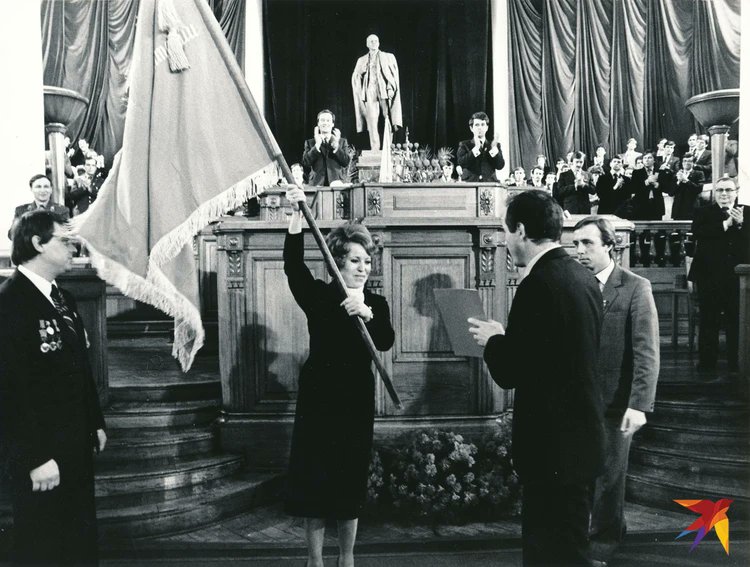
During Perestroika the Party rule crumbled. In 1989 the Soviet of the People's Deputies was convened, the first freely elected parliament since 1918. A lot of dissidents got in. In a country used to the Party rule it was a shock: tens of millions watched its debates in real time 

What did Matvienko do? Of course she joined. No, she didn't stand in elections. She joined the Soviet unelected through the NGO quota as a representative of the Committee of Soviet Women. In this assembly she led the Committee to Protect Women, Family, Motherhood and Childhood 

By 1991 it was clear that the old order will be transformed to something different. Therefore, Matvienko left her Party job and entered the diplomatic career. She was an ambassador in a major tax heaven Malta, then in Greece. She was reportedly involved in shady business schemes 
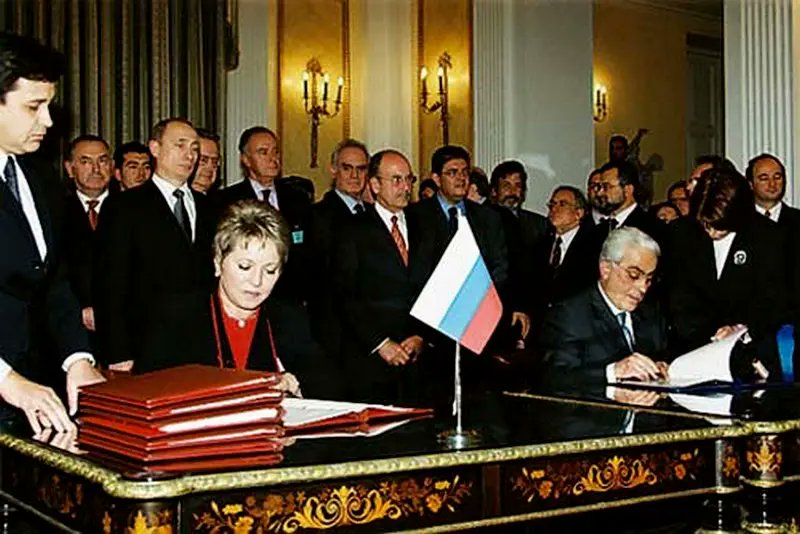
And finally in 1998 she becomes a Deputy Prime Minister of Russia. She was appointed by then Prime Minister Primakov. That's a very important fact: although she belongs to a Putin's closer circle, she rose in the ranks of Kremlin power long before the rise of Putin in Moscow 

Who was Primakov? Or that's a very interesting story. To put it simply, it was the most influential and well-networked politician in Russia. He was the only real rival of Putin in the contest for supreme power and 'drowning' Primakov required huge organised effort on all levels 
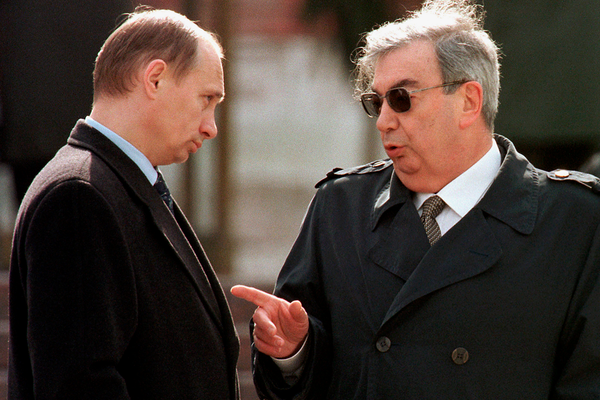
According to an official biography, Primakov was a 'historian of the Middle East, a scholar and a diplomat. For anyone familiar with the Soviet system it's crystal clear he was an intelligence officer. Here you see him commissioned to overwatch and guide the Kurdish militants 

Primakov rose very high during the last years of the USSR. First deputy head of KGB - the only 'civilian' (=undercover) on this position. A candidate to the Politburo. In new Russian Federation he led the SVR - the Service of Foreign Intelligence 

On 17 August 1998 Russia declared default. That's a low point of economic crisis. Prices skyrocketed, wages weren't paid. Striking coal miners occupied Moscow and more importantly blocked railways, stopping the flow of export commodities. Communists dominated in the Parliament 
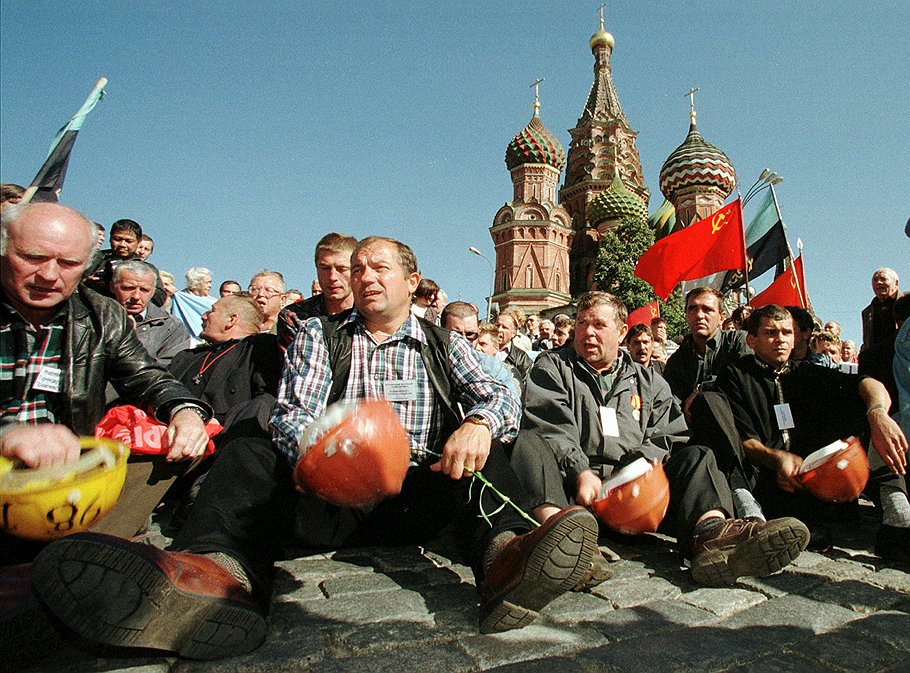
President Yeltsin was ill and dysfunctional. He couldn't work on daily administration. That meant whoever will be Prime Minister will concentrate enormous power, unchecked by the President. Moreover, Yeltsin's term would end in 2000. Which meant if PM is successful he can succeed
Who will be a PM? Previous one Kirienko was fired. He was largely a scapegoat anyway. Yeltsin tried to push his candidature Chernomyrdin. But the Communist-dominated Parliament rejected his appointment twice. Thus Yeltsin had to suggest someone else. And he suggested Primakov 

What followed next was widely considered as a return to normality. Economy started recovering, inflation decreased to only 84% (previously it could be as high as 2700% per year). As a PM Primakov gained immense power and popularity, acting largely independently from Yeltsin 

On 24 March 1999 he was flying to the USA to secure another loan. And yet during the flight Vice-President Al Gore called him and informed the US started bombing Serbia to stop the ethnic cleansing in Kosovo. Then Primakov turned his plane back to Russia, cancelling his visit 

It made Primakov immensely popular in Russia. 1990s were perceived as the huge national humiliation. Also Russian people would mostly identify themselves with Slavic Orthodox Serbs rather than with Albanians. That sparked a rise of nationalist sentiments which Primakov weaponised
In 1998-1999 oppositional, mostly Communist forces, which dominated in the Parliament tried to organise the impeachment of Yeltsin. With his rate of approval somewhere around 5% it was highly possible. Meanwhile Primakov, a Yeltsin's PM, openly hanged out with Communist leaders 

Well, Primakov would benefit from the Yeltsin's downfall. The most popular politician in the country, the informal leader of the intelligence and state security apparatus, a candidate personifying the 'return to normality' and nationalist revival, he would be a natural successor
12 March 1999. Yeltsin tells Primakov:
- Make my job easier, just resign stating whatever reason
- I don't want to make it easier. You have constitutional authority to fire me. But you're making a big mistake
Then Yeltsin calls his deputy Voloshin who brings the prepared order
- Make my job easier, just resign stating whatever reason
- I don't want to make it easier. You have constitutional authority to fire me. But you're making a big mistake
Then Yeltsin calls his deputy Voloshin who brings the prepared order
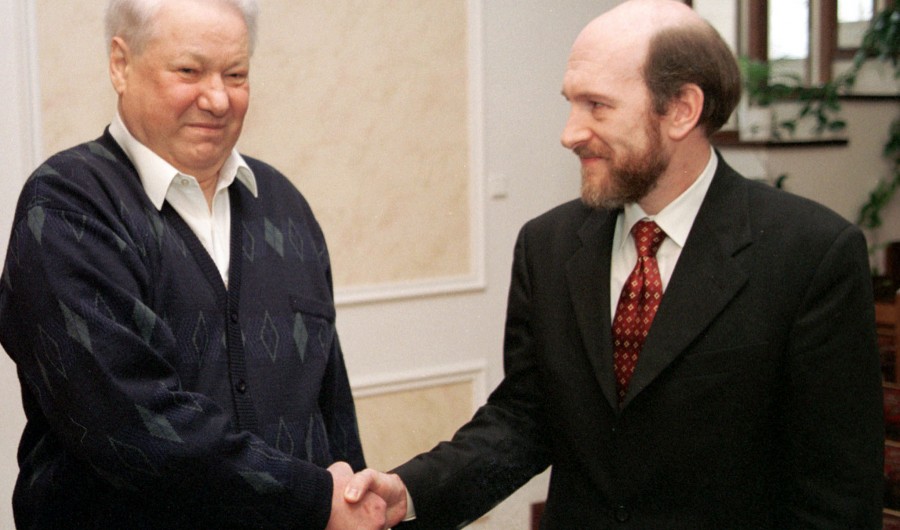
Now Primakov aims to win elections. And he had every chance to do so. He established the party 'Fatherland: All of Russia'. Key governors joined: the mayor of Moscow (left), governor of St Petersburg (right), presidents of Tatarstan, Bashortostan, Ingushetia and so on 

Unfortunately for Primakov Yeltsin's family already chose a new successor. Putin quickly rose becoming an official of Yeltsin's administration, the Chief of Federal Security Service and finally the Prime Minister. But he was unelectable. Nobody knew him and everyone knew Primakov 

Primakov was very popular among the intelligence and state security. Putin worked hard to establish his control over them. Firstly, he appointed another St Petersburg KGB officer Ivanov as the head of FSB Service of Internal Security - the office controlling other FSB branches 

Then Putin launched major reform in FSB. He reorganised state security, closing two departments, but creating new six, etc. Why? For the same reason such reforms are usually launched - for changing the power balance within state security and establishing his group over it
First, reforms included переаттестация, checking officers' qualification. You take their guns, take their IDs and they basically just sit in their offices unable to do anything until переаттестация is over. It's a legal and easy way to paralyse structures you need to paralyse
Secondly, when reorganising departments and abolishing some, you can fire, retire, transfer to other offices (in province), etc, people you wanna rid of. Thus Putin eliminated old KGB interest groups that were closer to Primakov. Overall he fired about 2 000 officers and generals
Putin also filled the state security leadership with his old friends - KGB officers from St Petersburg. Sechin, Patrushev, Cherkesov, Ivanov and many others, they were all these knew appointees from St Petersburg FSB taking over the chief Moscow office
Thus Putin took control over the most important offices - over state security and intelligence. But he was still unknown and unelectable, while Primakov was very popular. So, Putin needed to solve two problems - boost his own popularity and destroy Primakov's one
This was very much helped by a media tycoon Berezovsky and his henchman - a TV host Sergey Dorenko. Smart, charismatic, with powerful voice, Dorenko was known as a 'telekiller'. "TV-assassin" able to destroy reputation of literally anyone his patron wanted to destroy 

Dorenko obliterated Primakov. How? He didn't attack his policies, or corrupt schemes. He acted smarter. He knew that Primakov is having a knee surgery. So he showed footages knee surgeries, with all the blood and gore in prime time on national TV, and discussed it in all details 
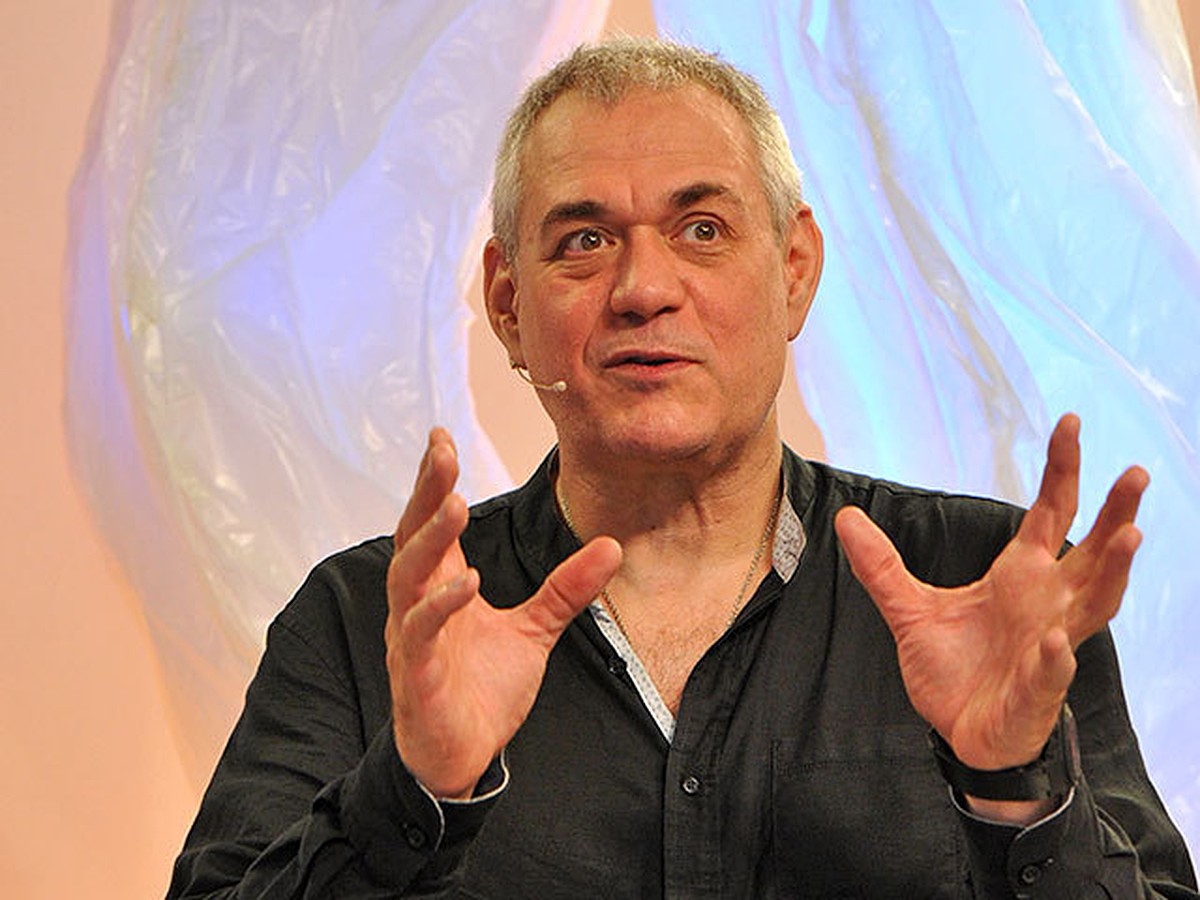
Dorenko didn't technically *attack* Primakov. He pretended to be concerned about his health. Thus he conveyed the idea that Primakov was frail, unhealthy (like Yeltsin). This take was considered unethical, but the country was too tired of gerontocracy. Primakov became unelectable 

Putin now controlled the intelligence. He made a heavy blow on Primakov. But he still needed political apparatus. So two of Berezovskies henchmen - Dorenko and Leontyev after a quick discussion wrote the project and agenda of a new Putin's party, that will become United Russia 

After that Putin's subordinates persuaded most of Primakov's MPs to leave their former boss and join this new Putin's party 'Unity' instead. Eventually, the 'Unity', the 'Fatherland: All of Russia' and 'Our Home Russia' would united and form the 'United Russia' party
How did they do it? Well, just after his appointment as the Chief of FSB, Putin started collecting info on all politicians and bureaucrats. Usually there was much of material for launching a prosecution. Thus he managed to blackmail them into obedience and hijack Primakov's party
Matvienko was one of many Primakov's appointees who switched to the new leader. In fact, she continuously kept her job under three different PMs: Primakov, Stepashin and Putin. Which reflects a great deal of manoeuvring ability and opportunism
Once gubernatorial elections in Russia were abolished in 2003, Matvienko became a governor of St Petersburg. No wonder that her son Sergei became a local real estate tycoon and a billionaire. In 2011 she leads the Council of Federation, the Russian Senate 

In this capacity she agreed to whatever Putin commanded and pushed his decisions through all the institutions. Technically president needs permission of parliament to use the army abroad. Of course she agreed to Putin using the army in Syria, in Karabakh and in 2014 - in Ukraine
I think Matvienko's career is quite symptomatic and gives some understanding of Russian political history and elite dynamics. A highly opportunistic Komsomol girl, she used whatever chance to advance, adhering to whatever political agenda dominated at that period
She has been unconditionally obedient to her bosses, whoever was her boss at this or that moment. In this respect, she is somewhat of a 'light switch' personality, pushing whatever agenda she is commanded to push and then doing an U-turn at the first order of the boss
I'd argue that such 'light switch' personality is vital for career. Opinionated people, people with strong personal convictions be it liberal, nationalist, socialist or even statist will not rise. Only fully obedient ones, ready to do an U-turn at the first order, will. End of🧵 

• • •
Missing some Tweet in this thread? You can try to
force a refresh






